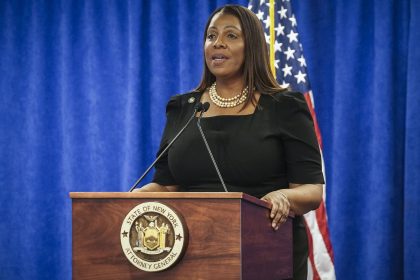Judges Hear Arguments Over Contentious Census Privacy Tool

MONTGOMERY, Ala. (AP) — The fight over whether the U.S. Census Bureau can use a controversial statistical technique to keep people’s information private in the numbers used for drawing political districts on Monday went before a judicial panel that must decide if the method provides enough data accuracy.
A panel of three federal judges heard arguments on whether the method known as “differential privacy” meets the federal legal requirement for keeping private the personal information of people who participated in the 2020 census while still allowing the numbers to be sufficiently accurate for the highly partisan process of redrawing congressional and legislative districts. Differential privacy adds mathematical “noise,” or intentional errors, to the data to obscure any given individual’s identity while still providing statistically valid information.
Because a panel of three federal judges will decide the matter, any appeal of the lawsuit brought by the state of Alabama could go straight to the Supreme Court.
Separately, another lawsuit brought by Alabama over the 2020 census was dismissed Monday at the request of the state. The lawsuit had tried to force the Census Bureau to exclude residents who are in the country illegally from the numbers used for divvying up congressional seats among the states. Alabama claimed it would lose a congressional seat if those residents were included, but the Cotton State defied expectations by keeping its seventh seat when the apportionment numbers were released last week. Former President Donald Trump issued a directive attempting to do the same thing, but President Joe Biden rescinded it when he took office in January.
In the lawsuit over the statistical method, Alabama and three Alabama politicians sued the Census Bureau earlier this year after the agency decided to delay the release of data used for drawing the political districts. Normally, the redistricting data is released at the end of March, but the Census Bureau pushed the deadline to sometime in August, at the earliest, because of delays caused by the coronavirus pandemic.
Alabama claims the delay was caused by the bureau’s attempt to implement differential privacy, which the state’s attorneys say will result in inaccurate redistricting numbers. At least 16 other states back Alabama’s challenge, which is asking the judges for a preliminary injunction to stop the Census Bureau from implementing the statistical technique. Alabama also wants the agency to release the redistricting data by July 31.
Alabama Solicitor General Edmund LaCour told the judges that the Census Bureau should return to a previous method for protecting privacy where easily identifiable characteristics in a household are swapped with data from another household.
“Small changes matter when you are dividing up power,” LaCour said.
Jason Torchinsky, a lawyer also representing Alabama, said the “little bit of noise” the bureau claims to insert could affect the accuracy of the data and consequently, the number of the state’s majority-minority districts, in which racial or ethnic groups make up a majority of a community.
Civil rights advocates, state lawmakers and redistricting experts have raised concerns that differential privacy will produce inaccurate data that will skew the distribution of political power and federal funds.
But Department of Justice attorney Elliott Davis, representing the Census Bureau, told the judges that previous methods of privacy protection, such as swapping information around, are not robust enough to guard against someone being able to “reverse engineer” the data to get people’s information.
Davis said computer power has risen exponentially since the early methods were developed for protecting privacy. The new method used by the Census Bureau protects privacy while providing statistically accurate data, he said.
“The error evens out,” Davis said.
Bureau officials say the change is needed to prevent data miners from matching individuals to confidential details that have been rendered anonymous in the massive data release. In a test using 2010 census data, which was released without the obscuring technique, bureau statisticians said they were able to re-identify 17% of the U.S. population using information in commercial databases.
The delay in the release of the redistricting data has sent states scrambling for alternative plans such as using other data, utilizing previous maps, rewriting laws dealing with the deadlines or asking courts to extend deadlines. The state of Ohio filed a similar lawsuit over the changed deadlines. A federal judge dismissed the case, but Ohio has appealed.
The three-judge panel did not indicate when it would rule.
























